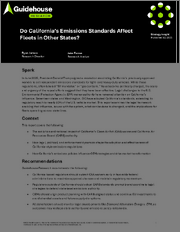
|
시장보고서
상품코드
1780254
캘리포니아주의 배기가스 기준은 다른 주의 플릿에도 영향을 미치는가?Do Californias Emissions Standards Affect Fleets in Other States? |
||||||
이 보고서는 최근 캘리포니아의 배기가스 면제 조치를 취소한 연방 정부의 조치에 따라 캘리포니아의 자동차 배기가스 기준이 17개 주와 워싱턴 DC의 채택을 통해 어떻게 전국적인 차량 행동을 계속 형성하고 있는지 조사했습니다. Clean Air Act의 면제 제도와 California Air Resources Board(CARB)의 역할 등 캘리포니아 주에 영향을 미치는 법적, 규제적 프레임워크에 대해 개괄적으로 설명합니다. 이 보고서에서는 캘리포니아주의 무공해차(ZEV) 보급을 가속화하는 Advanced Clean Cars and Trucks 프로그램의 효과를 다루고 있으며, 콜로라도주는 정책 재현의 성공 사례로 중요한 역할을 하고 있습니다. Diamond Alternative Energy v. EPA와 같은 법적 이슈는 주정부 차원의 권한과 배기가스 규제의 미래를 둘러싼 긴장이 고조되고 있음을 보여줍니다. Guidehouse Research는 규제 당국이 면제 권한을 유지하기 위해 전략적으로 행동하고, 각 주정부가 법적 방어책을 조정하며, OEM이 리스크를 줄이고 경쟁력을 유지하기 위해 CARB에 따라 제품 계획을 시장에 맞게 조정할 것을 권장하고 있습니다.
목차
- 캘리포니아주의 Clean Air Act(CAA) 면제와 California Air Resources Board(CARB) 권한의 변천과 전국적인 영향
- 법적, 정치적, 그리고 집행 역학은 캘리포니아식 배기가스 규제의 채택과 유효성에 어떻게 영향을 미치는가?
- 캘리포니아주의 배기가스 정책은 어떻게 OEM의 전략에 영향을 미치며, 시장 변혁을 추진하는가?
In response to recent federal actions rescinding California's emissions waivers, this report explores how California's vehicle emissions standards continue to shape national fleet behavior through adoption by 17 states and Washington, DC. It outlines the legal and regulatory framework that enables California's influence, including the Clean Air Act's waiver system and the role of the California Air Resources Board (CARB). The report highlights the effectiveness of California's Advanced Clean Cars and Trucks programs in accelerating zero-emission vehicle (ZEV) adoption, with Colorado serving as a key example of successful policy replication. Legal challenges, such as Diamond Alternative Energy v. EPA, underscore the growing tension over state-level authority and the future of emissions regulation. Guidehouse Research recommends that regulators act strategically to preserve waiver authority, that states coordinate legal defenses, and that OEMs align product planning with CARB-aligned markets to mitigate risk and maintain competitiveness.
Table of Contents
This report covers the following:
- The evolution and national impact of California's Clean Air Act (CAA) waiver and California Air Resources Board (CARB) authority
- How legal, political, and enforcement dynamics shape the adoption and effectiveness of California-style emissions regulations
- How California's emissions policies influence OEM strategies and drive market transformation











